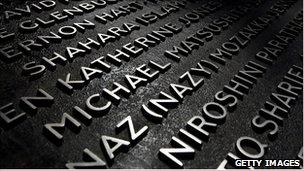7/7 inquests: Emergency delays 'did not cause deaths'
- Published
- comments

A memorial to the 52 people killed was unveiled in Hyde Park in 2009
Delays in the emergency services' response to the 7/7 London bombings did not cause the death of any of the 52 people killed, the coroner has said.
But in concluding the inquests into the deaths, Lady Justice Hallett criticised lapses by emergency services and MI5.
She made nine recommendations, external that aim to "save lives", and said no further inquiries, or inquests on the bombers, were needed.
She also formally ruled that the victims had been unlawfully killed.
More than 700 people were injured in the four suicide attacks, in 2005.
Speaking to a packed courtroom after 19 weeks of evidence, Lady Justice Hallett thanked the bereaved for their "understanding, support and quiet dignity".
Relatives called for the recommendations to be implemented, and called on Home Secretary Theresa May to promise action as "swiftly as possible".
Some families are continuing to call for a public inquiry, with many asking questions about whether MI5 could have prevented the atrocities.
The bombers targeted Tube trains at Aldgate, Edgware Road and Russell Square and a double decker bus in Tavistock Square. Nearly six years on, the inquests heard 309 witnesses and a further 197 statements.
The recommendations covered the security service MI5, the emergency services and Transport for London.
Heads of the services said they were proud of the work done by police, paramedics and firefighters on the day, adding that they would take time to digest the coroner's recommendations.
Andy Trotter, chief constable of the British Transport Police, said his force would "take time" to read the report, while London Ambulance Service chief executive Peter Bradley said he recognised some aspects of their response "should have been better".
London's transport commissioner Peter Hendy paid tribute to Transport for London (TfL) staff on duty on 7/7, adding that a "great deal" had been done since then to "improve our equipment, capabilities and preparedness for such major incidents".
Ms May said she was "pleased that the coroner has made clear there is simply no evidence that the Security Service knew of, and therefore failed to prevent, the bombings on 7/7".
But she added that everyone was "always looking to learn lessons and to improve the response to the terrorist threat we face".
Speaking later at a press conference, some relatives said they did not recognise her assessment of MI5's role.
Marie Fatayi-Williams, whose 26-year-old son Anthony died at Tavistock Square, said only a public inquiry could address concerns about the Security Service. Graham Foulkes, the father of victim David Foulkes, 22, also called for an independent inquiry with "a much broader scope and a much broader remit" than the inquest.
The coroner praised the efforts of both the Security Service and the emergency services, alongside recommendations to improve systems for the future.
One was that MI5 should review its procedures on showing photographs to informants.
The inquest had heard the security services failed to show a colour surveillance photograph of two of the bombers - Mohammad Sidique Khan and Shehzad Tanweer - to an al-Qaeda supergrass before the attacks.
The photo was cut in half and cropped by an MI5 desk officer who it was said at the inquest "must have been very busy or acting at great speed".
MI5's chief of staff - who gave evidence as 'Witness G' - had "speculated" that the cropped photograph of Khan was of such poor quality that it was not deemed worth showing, said the coroner in her report.
"This, of course, begs the question of why the photographs... were cropped in this way. They were dreadful," the coroner said.
MI5 had 'huge task'
Lady Justice Hallett also expressed concerns about the Security Service's record-keeping, criticising the "accuracy and completeness of information provided by MI5" to Parliament's Intelligence and Security Committee (ISC).
She said Witness G had "seemed to accept" during the hearings that the ISC had received information in closed hearings from the Security Service - but subsequent mistakes in a committee report were not corrected.
"It may be that some were the results of the service's poor record-keeping and at least one inaccuracy according to 'G' was 'because we didn't brief them correctly'."
Lady Justice Hallett also addressed MI5's 2004 assessment that Khan and Tanweer were not a threat to national security.
She went to say, however, that it was "worth noting the huge task which confronts [the Security Service] on a daily basis".
With the examination of the emergency service response having been a major part of the inquiry's remit, the coroner concluded that the problems encountered had not led to any deaths.
"I'm satisfied on balance of probabilities that each victim would have died whatever time the emergency services had arrived," she said.
But she said they must work better with each other at major incidents to help them respond more quickly and "hopefully prevent future deaths".
All the services encountered "real difficulties" in locating each other in the immediate wake of the bombings.
Among several recommendations in the report were calls to review inter-agency major incident training, to review the way TfL is alerted to major incidents affecting the Tube network, and to look at how rendezvous points are established for emergency services in such incidents.
She also said TfL should reconsider if it was "practicable to provide first aid equipment on underground trains".
Lady Justice Hallett said in her remarks, external that she was not aware of having left any reasonable stone unturned during the inquests.
The proceedings had gone "much further than simply recording the sad fact that 52 innocent members of the travelling public were unlawfully killed in a dreadful act of terrorism," she said, adding: "We have unearthed material that has never previously seen the light of day."
- Published6 May 2011
- Published6 May 2011